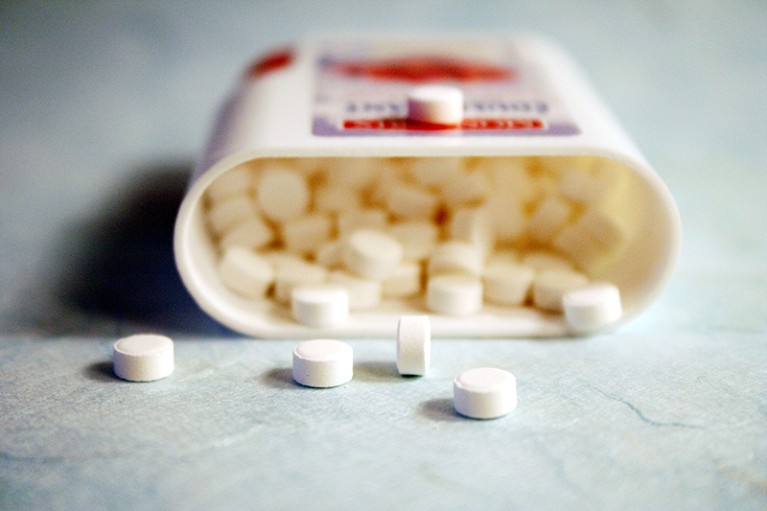
The cancer-research arm of the World Health Organization (WHO) has classified the low-calorie sweetener aspartame as ‘possibly carcinogenic’.
The International Agency for Research on Cancer (IARC) in Lyon, France, said its decision, announced on 14 July, was based on limited evidence for liver cancer in studies on people and rodents.
However, the Joint FAO/WHO Expert Committee on Food Additives (JECFA) said that recommended daily limits for consumption of the sweetener, found in thousands of food and drink products, would not change.
“There was no convincing evidence from experimental or human data that aspartame has adverse effects after ingestion, within the limits established by previous committee,” said Francesco Branca, director of the WHO’s Department of Nutrition and Food Safety, at a press conference on 12 July in Geneva, Switzerland.
The new classification “shouldn’t really be taken as a direct statement that indicates that there is a known cancer hazard from consuming aspartame”, said Mary Schubauer-Berigan, acting head of the IARC Monographs programme, at the press conference. “This is really more of a call to the research community to try to better clarify and understand the carcinogenic hazard that may or may not be posed by aspartame consumption.”
Other substances classed as ‘possibly carcinogenic’ include extracts of aloe vera, traditional Asian pickled vegetables, some vehicle fuels and some chemicals used in dry cleaning, carpentry and printing. The IARC has also classified red meat as ‘probably carcinogenic’ and processed meat as ‘carcinogenic’.
Sweet science
Aspartame is 200 times sweeter than sugar and is used in more than 6,000 products worldwide, including diet drinks, chewing gum, toothpaste and chewable vitamins. The US Food and Drug Administration (FDA) approved it as a sweetener in 1974 and, in 1981, the JECFA established an acceptable daily intake (ADI) of 40 milligrams per kilogram of body weight. For a typical adult, this translates to about 2,800 milligrams per day — equivalent to 9–14 cans of diet soft drinks.
The artificial sweetener has been the subject of several controversies over the past four decades linking it to increased cancer risk and other health issues. But re-evaluations by the FDA and the European Food Safety Authority (EFSA) have found insufficient evidence to reduce the ADI.
In 2019, an advisory group to the IARC recommended a high-priority assessment of a range of substances, including aspartame, on the basis of emerging scientific evidence. The IARC’s evidence for a link between aspartame and liver cancer comes from three studies that examined the consumption of artificially sweetened beverages.
One of these, published online in 2014, followed 477,206 participants in 10 European countries for more than 11 years and showed that the consumption of sweetened soft drinks, including those containing aspartame, was associated with increased risk of a type of liver cancer called hepatocellular carcinoma1. A 2022 US-based study showed that consumption of artificially sweetened drinks was associated with liver cancer in people with diabetes2. The third study, involving 934,777 people in the US from 1982 to 2016, found a higher risk of pancreatic cancer in men and women consuming artificially sweetenedbeverages.
These studies used the drinking of artificially sweetened beverages as a proxy for aspartame exposure. Such proxies are quite reliable, but do not always provide a precise measure of intake, says Mathilde Touvier, an epidemiologist at the French National Institute of Health and Medical Research in Paris.
Touvier co-authored another study included in IARC’s assessment, which considered aspartame intake from different food sources including soft drinks, dairy products and tabletop sweeteners. The study found that among 102,865 adults in France, people who consumed higher amounts of aspartame (but less than the recommended ADI) had an increased risk of breast cancer and obesity-related cancers3.
The study shows “a statistically significant increased risk, robust across many sensitivity analyses”, says Touvier. But “it hasn’t had enough statistical power to investigate liver cancer for the moment ”.
Not always reliable
The JECFA also evaluated studies associating aspartame with liver, breast and blood cancers but said that the findings were not consistent. The studies had design limitations, couldn’t rule out confounding factors, or relied on self-reporting of daily dietary aspartame intake.
“Dietary records are not always the most reliable. We aren’t just ingesting aspartame as a single agent. It’s part of a combination of chemicals and other things,” says William Dahut, chief scientific officer of the American Cancer Society, who is based in Bethesda, Maryland.
In the body, the sweetener breaks down into three metabolites: phenylalanine, aspartic acid and methanol. “These three molecules are also found from the ingestion of other food or drink products,” says Branca. This makes it impossible to detect aspartame in blood testing. “That’s a limitation of our capacity to understand its effects.”
Methanol is potentially carcinogenic because it is metabolised into formic acid, which can damage DNA. “If you have enough methanol, it damages your liver and there's a risk of liver cancer,” says Paul Pharoah, a cancer epidemiologist at Cedars-Sinai Medical Center in Los Angeles. But the amount of methanol generated by aspartame breaking down is trivial, he adds.
More studies are needed to explore aspartame’s impact on metabolic processes, as well as its links to other diseases, the IARC says. “This research will also bring new pieces of evidence to the global picture,” adds Touvier.
"behind" - Google News
July 14, 2023 at 10:35PM
https://ift.tt/dGHvI7f
Aspartame is a possible carcinogen: the science behind the decision - Nature.com
"behind" - Google News
https://ift.tt/KwqlTIL
https://ift.tt/caDrMk9
Bagikan Berita Ini














0 Response to "Aspartame is a possible carcinogen: the science behind the decision - Nature.com"
Post a Comment